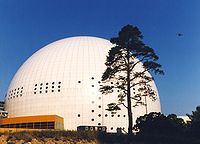Roaring 1980s
The Roaring 1980s (Swedish: Glada 1980-talet) is the name of the economic boom in Sweden during the mid-late 1980s.
Background[edit]
The years after the 1973 oil crisis was a time of economic recession. In October 1982 a devaluation of the Swedish currency was done.[1] On 21 November 1985, the credit market became free.[2] and the international economic boom that had begun spread into Sweden.
Trends[edit]
A yuppie culture developed at the Stockholm Stock Exchange. Mobile telephones were also known by the popular nickname "yuppienalle". ("Yuppie's teddy bear")[3] The term finansvalp ("finance puppy") was common when referring to young businessmen. The contemporary yuppie culture was criticized by, among others, Stig Malm in his 1987 First of May speech.[4]
Buying and selling art also became popular within the world of businesses.[5]
Culture and other entertainment[edit]


The Stockholm Globe Arena was built between 1986-1988 and opened in 1989. It has been described as an expression of the contemporary optimism for the future.[6] Several summer parks opened during this period.[7]
Popular culture[edit]
The 1993 Magnus Uggla song Mitt decennium describes the phenomena.[8]
See also[edit]
References[edit]
- ^ Horisont 1982 (in Swedish). Bertmarks. 1983. pp. 220–221.
- ^ "Ollevik: Alliansen har skapat nya branscher" (in Swedish). Svenska dagbladet. 13 October 2013. Retrieved 19 February 2015.
- ^ Yvonne Edenholm (6 May 2011). "För dig som saknar yuppienallen" (in Swedish). Ny teknik. Retrieved 20 February 2015.
- ^ Spängs Thorbjörn (3 February 1997). "Stadshuset: En halv miljard försvann. 10 år sedan de vidlyftiga optionsaffärerna" (in Swedish). Dagens nyheter. Retrieved 20 February 2015.
- ^ Matilda Gustavsson (15 April 2014). "Omstridda avtal på Bukowskis" (in Swedish). Dagens nyheter. Retrieved 20 February 2015.
- ^ Hans Dahlberg (1999). "En liten tid av överdåd". Hundra år i Sverige (in Swedish). Albert Bonniers. p. 341.
- ^ Övergivna platser - Svenska sommarland, accessdate: 28 September 2012
- ^ "90-talet" (in Swedish). LG25. Retrieved 10 August 2011.
